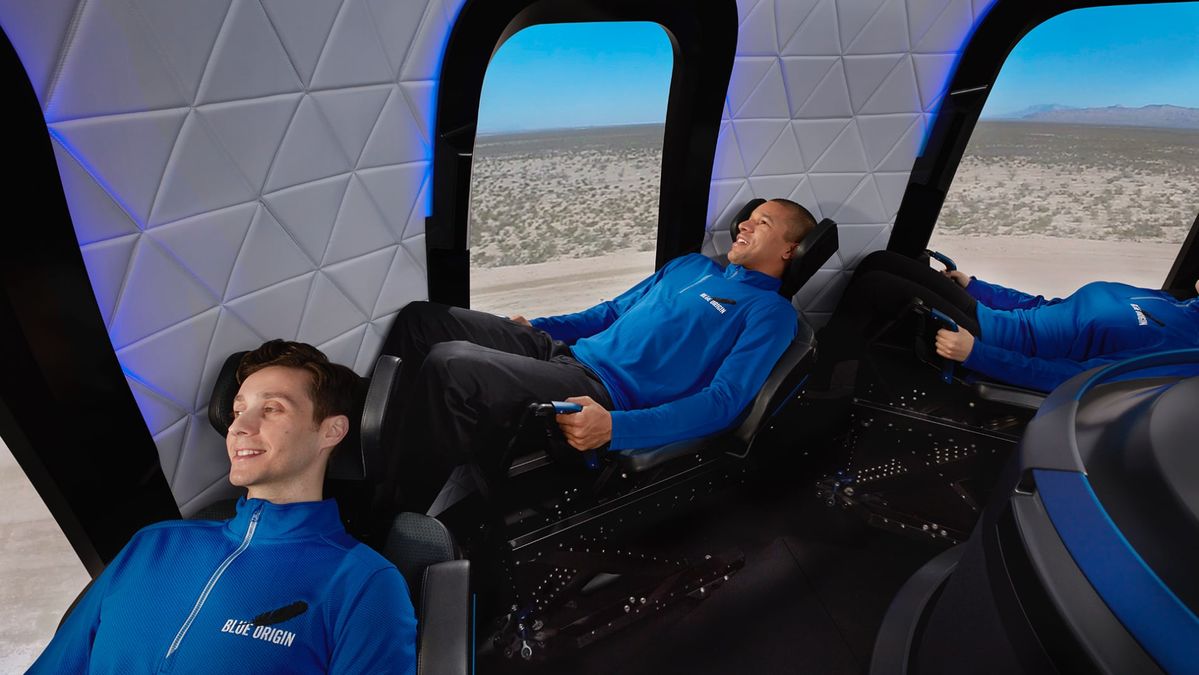Take an out of this world trip on Blue Origin’s first manned rocket
Wealthy would-be astronauts can now bid for a seat into space, and the auction's already rocketed past $3.6 million.

Astronaut Alan Shepard trained for two years to become the first American to go into space in 1961. Sixty years later, a deep-pocketed civilian will journey toward the stars after just a two-day warm-up.
Blue Origin, the space venture founded by Amazon.com’s billionaire founder Jeff Bezos, is publicly auctioning off a seat on its first crewed flight, which is scheduled to occur on July 20.
At press time, the high bid stood at US$2.8 million. There have been more than 5,200 bidders, from 136 different countries, the company says. Bidding will end with a live auction on June 12.
Within just over a month, the winning bidder will get to take an 11-minute trip just beyond the boundaries of the Earth’s atmosphere – to about 105km (65 miles) above sea level – in a six-passenger capsule propelled by Blue Origin’s reusable New Shepard rocket.
At the flight highest point, passengers will be able to unbuckle and float around in zero gravity for about three minutes, taking in the view through what Blue Origin says are the largest windows ever to leave the planet.
“They’ll get that spectacular view of space and of Earth,” says Ariane Cornell, director of astronaut and orbital sales for Origin Blue. “They might have time for a couple of somersaults before they buckle back in.”
A parachute-cushioned ride will bring the capsule in for a landing in the West Texas desert.
Training for civilian space flight
Aside from the flight experience, the auction includes two days of training at Blue Origin’s launch site in the Guadalupe Mountains, about two hours from El Paso.
There, the winner will get familiar with the launch team and the rest of the as-yet-unidentified crew and will learn how to enter and exit the capsule and go through some emergency procedures, Cornell says. They’ll board the New Shepard 30 minutes before launch.
The process was designed to be as simple and accessible as possible, Cornell says. “We want it to become much like flying on a commercial airline today.”
“Obviously, we’re going to do more for our customers, because it is a rocket. But we don’t want the whole experience to be so strenuous that you limit it to a small portion of the population.”
Inside your Blue Origin ride
The capsule is roomy and spare, without the arrays of switches and gauges that movies have conditioned us to expect on spacecraft.
The vehicle is autonomous, so there is no pilot or attendant equipment on board – just six passengers, all with their own windows onto the cosmos and personal screens for in-flight updates rather than HBO-on-demand.
The rocket will detach from the capsule about three minutes into the flight, steering back to its own landing pad. An escape motor built into the capsule should fire up if any issues are detected with the rocket, Cornell says.
It has been tested on the launch pad, at the peak of dynamic pressure in flight (known as max q), and at the highest altitude where it would be needed.
This will be Blue Origin’s 16th flight. Cornell says the previous test flights confirmed the craft’s safety.
The last tourist to go into space was Canadian billionaire artist Guy Laliberté, who in 2009 traveled to the International Space Station on Russian spacecraft Soyuz.
Blue Origin’s flight will end the 12-year dry spell, but isn’t the only one planned for this year.
In fact, 2021 has been shaping up as a big year for civilian space travel.
In January, it was revealed that three wealthy businessmen had each paid US$55 million to travel to the International Space Station on one of Elon Musk’s SpaceX craft; they are to spend eight days at the station before returning home.
Soon after, Jared Isaacman, the billionaire founder of Shift4 Payments, announced that he would give away three seats on a SpaceX flight he had paid for. One was raffled off in a sweepstakes to benefit St. Jude Children’s Research Hospital in Memphis, raising some US$13 million.
Richard Branson, founder of Virgin Galactic, is planning to fly on one of his vehicles this summer; the company will also resume ticket sales, which were suspended after a test pilot died in a 2014 crash. The company had already sold about 600 seats at up to US$250,000 each.
Blue Origin’s auction started on May 5 with closed bidding. For the first round there was no minimum, Cornell says. “We wanted to get as many people engaged in this as possible.”
The second round will continue from now until June 10. Anyone can register to bid by placing a US$10,000 deposit and then being vetted over the phone by Blue Origin’s auction company. The final auction will take place online on June 12.
The three-stage process will effectively serve as lead generation for Blue Origin, which has announced that it will launch a couple of additional crewed flights by the end of 2021.
“We have not announced how, when, or for how much we will be selling those tickets,” Cornell says.
“That said, the people that participate in the auction - the most competitive – are going to be on our radar. We’re going to be calling those people to give them access to those early seats.”
Proceeds from the auction will go to Club for the Future, Blue Origin’s foundation, which aims to inspire future generations to pursue STEM careers. The foundation’s flagship initiative will be to let people send postcards into space via the New Shepard.
This article is published under license from Bloomberg Media: the original article can be viewed here









